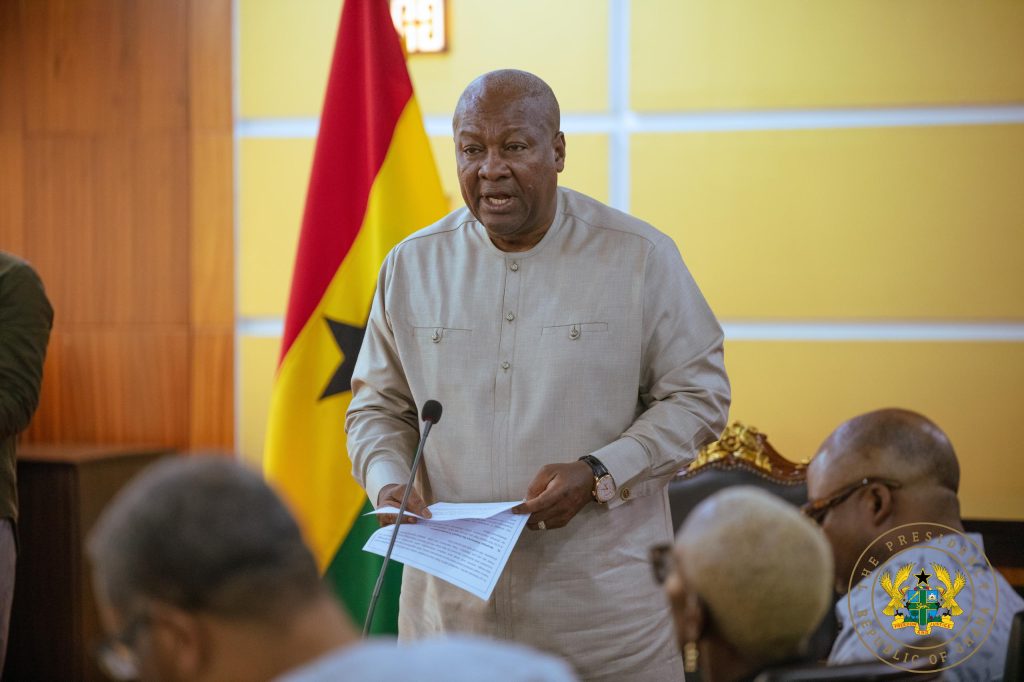Our Terms & Conditions | Our Privacy Policy
Mahama inaugurates AEDAC to boost Ghana’s export
By Iddi Yire
Accra, May 06, GNA – President John Dramani Mahama has inaugurated the Accelerated Export Development Advisory Committee (AEDAC) as part of efforts to turn Ghana into an export-led economy.
The 19-member committee, which is under the chairmanship of the President marks the fulfilment of his campaign promise in 2024 to personally work with industry leaders to remove the bottlenecks and disincentives to rapid expansion of Ghana’s export sector.
This is intended to make Made-in-Ghana goods available and loved across the African continent and in the international marketplace.
This move comes alongside his 24-Hour Economy plan aimed at boosting economic growth and creating job opportunities for the country.

President Mahama said under the AEDAC and the National Export Development Strategy, the aim was to grow Ghana’s non-traditional export earnings from $3.5 billion annually to at least $10 billion by 2030.
He noted that to achieve this, they would prioritize value addition and economic diversification.
He said Ghana’s current exports remain dominated by low-complexity raw materials, such as gold, cocoa, cashew, timber, all in their raw state.
The President said the inauguration of the AEDAC marks a critical step in their collective resolve to transform Ghana’s economy through competitive exports, inclusive industrialization, and purposeful integration into regional and global markets.
He noted that despite its enormous promise, Ghana’s export sector remains constrained by entrenched bottlenecks.
“Nearly 47 per cent of Ghanaian exporters report facing serious trade obstacles, with non-tariff measures and procedural delays accounting for most of these challenges,” he stated.
He added: “Over 52 per cent of the complaints relate to costly and time-consuming technical regulations and multiple poorly coordinated agencies imposing. An exporter may require up to 16 different documentations to obtain a certificate of origin alone.”
He said the Ghana Standards Authority’s task with safeguarding quality was often under-resourced; adding that at the same time, the absence of accredited local laboratories forces exporters to rely on foreign testing facilities, raising their costs and causing unnecessary delays.
He said at the nation’s ports, the overlapping inspections, extended clearance times, and informal fees were all a burden for exporters.
According to the International Trade Center, these inefficiencies cost Ghana up to $4.3 billion in lost export revenue each year.
The President said in the nation’s fisheries sector, repeated alerts from the European Union concerning illegal fishing, hydrocarbon and heavy metal contamination had led to temporary bans against their fish exports, and this had come with significant reputational damage.
President Mahama said on the Global Economic Complexity Index, Ghana ranked 110 out of 133 countries.
“This must change. We will support our private sector partners to invest in agri-processing and light manufacturing,” he said.
He said that AEDAC would work closely with the private sector, development partners, academia, and regional institutions to dismantle barriers, identify new export opportunities, and drive coordinated reform.
Mr Goosie Tanoh, Presidential Advisor for 24-Hour Economy, said the AEDAC programme envisions a resilient, self-reliant, and globally competitive economy that optimises asset utilisation and creates value for all its citizens, especially the most vulnerable.
He said the Programme was built around three fundamental pillars: production transformation, market systems efficiency, and human capital development.
GNA
BM
[ad_1]
Images are for reference only.Images and contents gathered automatic from google or 3rd party sources.All rights on the images and contents are with their legal original owners.
[ad_2]



Comments are closed.